历年高考全国卷英语听力试题(2005-2015)
- 格式:docx
- 大小:44.66 KB
- 文档页数:24
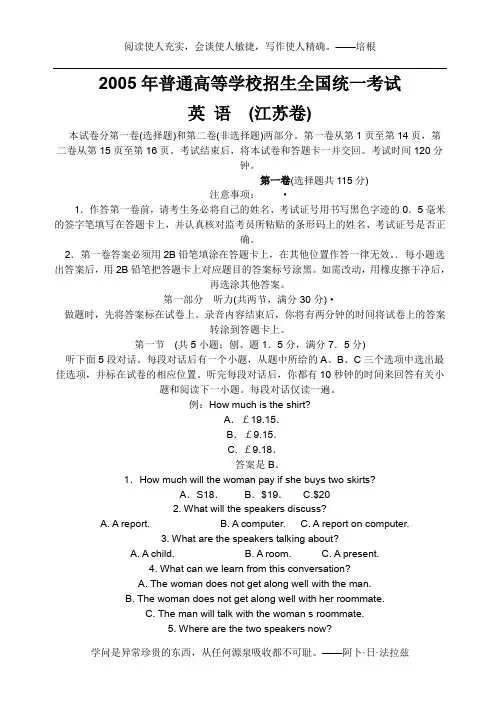
2005年普通高等学校招生全国统一考试英语(江苏卷)本试卷分第一卷(选择题)和第二卷(非选择题)两部分。
第一卷从第1页至第14页,第二卷从第15页至第16页。
考试结束后,将本试卷和答题卡一并交回。
考试时间120分钟。
第一卷(选择题共115分)注意事项:·1.作答第一卷前,请考生务必将自己的姓名、考试证号用书写黑色字迹的0.5毫米的签字笔填写在答题卡上,并认真核对监考员所粘贴的条形码上的姓名、考试证号是否正确。
2.第一卷答案必须用2B铅笔填涂在答题卡上,在其他位置作答一律无效。
.每小题选出答案后,用2B铅笔把答题卡上对应题目的答案标号涂黑。
如需改动,用橡皮擦干净后,再选涂其他答案。
第一部分听力(共两节,满分30分)·做题时,先将答案标在试卷上。
录音内容结束后,你将有两分钟的时间将试卷上的答案转涂到答题卡上。
第一节(共5小题;刨、题1.5分,满分7.5分) 听下面5段对话。
每段对话后有一个小题,从题中所给的A、B、C三个选项中选出最佳选项,并标在试卷的相应位置。
听完每段对话后,你都有10秒钟的时间来回答有关小题和阅读下一小题。
每段对话仅读一遍。
例:How much is the shirt?A.£19.15.B.£9.15.C. £9.18.答案是B。
1.How much will the woman pay if she buys two skirts?A.S18.B.$19. C.$202. What will the speakers discuss?A. A report.B. A computer.C. A report on computer.3. What are the speakers talking about?A. A child.B. A room.C. A present.4. What can we learn from this conversation?A. The woman does not get along well with the man.B. The woman does not get along well with her roommate.C. The man will talk with the woman s roommate.5. Where are the two speakers now?A. On the first floor.B. On the fourth floorC. On the fifth floor.第二节(共15小题;每小题1.5分,满分22.5分) ,听下面5段对话。
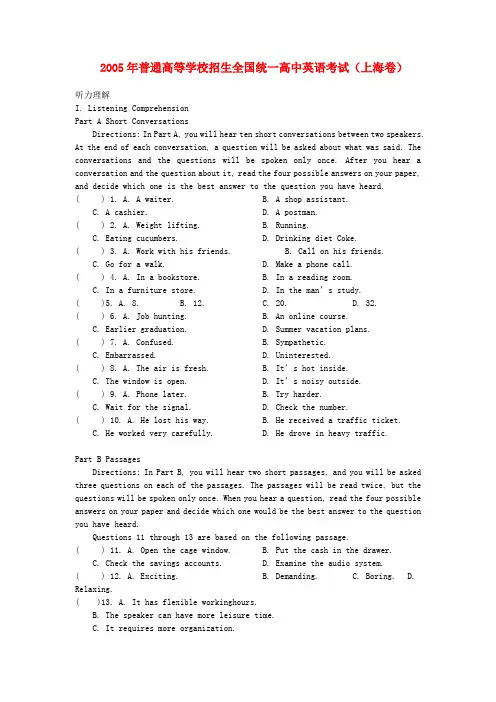
2005年普通高等学校招生全国统一高中英语考试(上海卷)听力理解I. Listening ComprehensionPart A Short ConversationsDirections: In Part A, you will hear ten short conversations between two speakers. At the end of each conversation, a question will be asked about what was said. The conversations and the questions will be spoken only once. After you hear a conversation and the question about it, read the four possible answers on your paper, and decide which one is the best answer to the question you have heard.( ) 1. A. A waiter. B. A shop assistant.C. A cashier.D. A postman.( ) 2. A. Weight lifting. B. Running.C. Eating cucumbers.D. Drinking diet Coke.( ) 3. A. Work with his friends. B. Call on his friends.C. Go for a walk.D. Make a phone call.( ) 4. A. In a bookstore. B. In a reading room.C. In a furniture store.D. In the man’s study.( )5. A. 8. B. 12. C. 20. D. 32.( ) 6. A. Job hunting. B. An online course.C. Earlier graduation.D. Summer vacation plans.( ) 7. A. Confused. B. Sympathetic.C. Embarrassed.D. Uninterested.( ) 8. A. The air is fresh. B. It’s hot inside.C. The window is open.D. It’s noisy outside.( ) 9. A. Phone later. B. Try harder.C. Wait for the signal.D. Check the number.( ) 10. A. He lost his way. B. He received a traffic ticket.C. He worked very carefully.D. He drove in heavy traffic.Part B PassagesDirections: In Part B, you will hear two short passages, and you will be asked three questions on each of the passages. The passages will be read twice, but the questions will be spoken only once. When you hear a question, read the four possible answers on your paper and decide which one would be the best answer to the question you have heard.Questions 11 through 13 are based on the following passage.( ) 11. A. Open the cage window. B. Put the cash in the drawer.C. Check the savings accounts.D. Examine the audio system.( ) 12. A. Exciting. B. Demanding. C. Boring. D. Relaxing.( )13. A. It has flexible workinghours.B. The speaker can have more leisure time.C. It requires more organization.D. The speaker can daydream while working.Questions 14 through 16 are based on the following news.( )14. A. A natural disaster. B. A power failure.C. Homeless farmers.D. A serious accident.( )15. A. Jews and some Arabs. B. Arabs and North Africans.C. Jews and North Africans.D. North Americans and some Arabs. ( )16. A. Exchange them for banks. B. Save them for travelers.C. Collect them for poor children.D. Spend them on duty-free goods.Part C Longer ConversationsDirections: In Part C, you will hear two longer conversations. The conversations will be read twice. After you hear each conversation, you are required to fill in the numbered blanks with the information you have heard.Complete the form. Write ONE WORD for each answer.Complete the form. Write NO MORE THAN THREE WORDS for each answer.听力原文:Part A Short ConversationsText 1M: Here is your express mail from New York. Could you please sign your name here?W: Sure, thanks.Question: What is the man’s probable occupation?Text 2W: When I go on a diet, I eat only cucumbers, and that reduces my weight quickly.M: I prefer to eat whatever I want and then run to lose weight.Question: What helps the woman to lose weight?Text 3W: Are you free this evening?M: I’ll take a walk, and then call on some friends.Question: What will the man do first?Text 4W: Excuse me. Where can I find dictionaries?M: The regular-priced ones are here, plus we have some on sale over on that table.Question: Where does this conversation probably take place?Text 5M: The temperature is supposed to reach 20 today, and go down to 12 this evening.W: Isn’t that a difference of about 8 degrees?Question: What is the evening temperature forecast?Text 6M: During the summer vacation, I hope to earn some money. How about you?W: I’m going to take an online course, so I can graduate sooner.Question: What are the two speakers mainly talking about?Text 7M: Another rejection letter? Maybe I will never get a good job.W: Oh, no!Question: How does the woman feel about this man’s remark?Text 8M: Would you mind if I open the window? We need some fresh air.W: We also need to keep it quiet in here.Question: What does the woman mean?Text 9M: Every time I call the number, I get a busy signal.W: Wait an hour and try again.Question: What does the woman suggest that the man do?Text 10W: I thought you were going to drive carefully, so you wouldn’t get a traffic ticket.M: I was, but it didn’t work out that way.Question: What can we learn about the man?Part B PassagesPassage One:I work at a big city bank. I do the same thing every day. Most people hate that kind of work, but I actually like it. I can daydream, and daydream for almost 40 hours a week. Don’t misunderstand. My job isn’t always easy. Maybe it requires less concentrations than other jobs, but it requires more organization. I have to be ready for work when the bank opens at nine every day. Before opening my cage window, I put the cash in my drawer. Then I make sure that the audio system is working. After checking the machine, I sit at my window, ready for work and for daydreaming. People come and go. Most of them deposit checks or withdraw money from their savings accounts.Occasionally, customers require special help from me. At these times, I have to stop dreaming and concentrate. But usually the work is easy, automatic. Most people think the work is dull. “You must be crazy,” they say. But I’m not crazy. I’m only a dreamer. I really enjoy daydreaming.Questions:11. What does the speaker do first before the bank opens?12. According to the passage, what do most people think of the sp eaker’s job?13. Why does the speaker like the job?Questions 14 through 16 are based on the following news.Passage Two:It is 7 o’clock, time for the morning news.Indonesia: Two tornadoes tore through northern Indonesia late Sunday, killing at least 40 people, injuring nearly 1 000, and leaving thousands of the homeless, officials said. The tornadoes blew away huts in dozens of farming villages, and brought down thousands of trees and electricity poles, plunging the villages into darkness.France: The number of hate crimes, mainly against Jews and against Arabs of North African origin, nearly doubled last year, to 1 565, according to a report to the government. It said 62% of the total were anti-Jewish acts. Acts against people of North African origin totaled 595 in 2004.The United Nations: Returning tourists and travelers have always had a problem with unspent coins. The handful of foreign coins is always not sufficient to buy much from the duty-free shop, and banks are usually reluctant to exchange such small sums. Last month, the United Nation’s Children’s Fund started a program called “Change for Good”. It aims to collect these coins unwanted by tourists but which may save the lives of children in developing countries.Questions:14. What is the first news item mainly about?15. Who are the main targets in the hate crimes in France?16. What will the program “Change for Good” do with the unspent coins?Part C Longer ConversationsText 1M: Regent Conference Centre.W: Hello! It’s Joanne from Addison International. I’d like to book a meeting room for our international conference.M: Certainly. So, Joanne, your surname is Collense, isn’t it?W: Colley, C-O-L-L-E-Y.M: Oh, yes. And you usually have the Darwin Room.W: Yes, please. It’s for the 28th of Jul y.M: The 26th and the 27th are already booked, but let me check. Yes, it’s free on the day you want.W: Good!M: Can you give me an idea as to the number of people coming?W: About 40. I’ve got 35 people who are definite. There will be a few more as well, no more than 45 though.M: OK!W: Can you give me the price? I think last time it was 675 pounds for the same room.M: We’ve made a small increase, so it should be 720. But as you are a regular customer, we are keeping the old price for now.W: Excellent. Thanks.Complete the form. Write ONE WORD for each answer.Text 2M: Boss, we can have robots make cough medicine for us.W: Robots? Why are you talking about robots? We are a small company.M: You see, we make 10 different kinds of cough medicine, but each operation only has four steps.W: How many robots do we need then?M: Four. The first robot will measure and mix the materials for the medicine;a second robot will pour the mixture into the bottles. Then a third robot will put on the labels; the last robot will pack the bottles into boxes.W: And what happens when one of the robots breaks down?M: The robot company will have a mechanic here within an hour.W:I just can’t imagine. What will we have here? A quiet building with robots rolling around doing the work ?M: That’s it ! And these robots are great workers. They won’t call in sick. They will work 24 hours a day.W: It sounds like a good idea. But what about the workers here?M: That’s what I’m wor ri ed about. We won’t need them anymore.Complete the form. Write NO MORE THAN THREE WORDS for each answer.听力答案:Part A Short Conversations1. D 解析:预读选项,可推测此题考查人物职业,只要捕捉到关键词mail,即可选出答案。
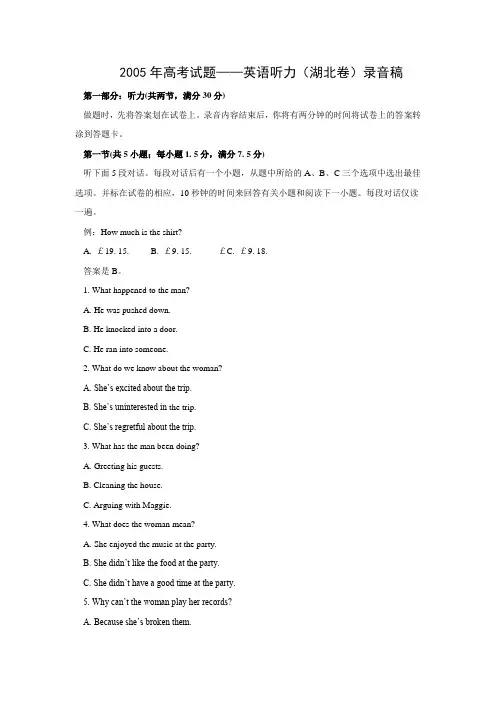
2005年高考试题——英语听力(湖北卷)录音稿第一部分:听力(共两节,满分30分)做题时,先将答案划在试卷上。
录音内容结束后,你将有两分钟的时间将试卷上的答案转涂到答题卡。
第一节(共5小题;每小题1. 5分,满分7. 5分)听下面5段对话。
每段对话后有一个小题,从题中所给的A、B、C三个选项中选出最佳选项。
并标在试卷的相应,10秒钟的时间来回答有关小题和阅读下一小题。
每段对话仅读一遍。
例:How much is the shirt?A. £19. 15.B. £9. 15. £C. £9. 18.答案是B。
1. What happened to the man?A. He was pushed down.B. He knocked into a door.C. He ran into someone.2. What do we know about the woman?A. She’s excited about the trip.B. She’s uninterested in the trip.C. She’s regretful about the trip.3. What has the man been doing?A. Greeting his guests.B. Cleaning the house.C. Arguing with Maggie.4. What does the woman mean?A. She enjoyed the music at the party.B. She didn’t like the food at the party.C. She didn’t have a good time at the party.5. Why can’t the woman play her records?A. Because she’s broken them.B. Because she’s left them in the cafe.C. Because she’s forgotten where she put them.第二节(共15小题;每小题1. 5分,满分22. 5分)听下面5段对话或独白。

2018—2005高考全国卷英语听力真题2018年普通高等学校招生全国统一考试(新课标I)听力部分第一节(共5小题;每小题1.5分,满分7.5分)1. What will James do tomorrow?A. Watch a TV program.B. Give a talk.C. Write a report.2. What can we say about the woman?A. She’s generous.B. She’s curious.C. She’s helpful.3. When does the train leave?A. At 6:30.B. At 8:30.C. At 10:30.4. How does the woman go to work?A. By car.B. On foot.C. By bike.5. What is the probable relationship between the speakers?A. Classmates.B. Teacher and student.C. Doctor and patient.第二节(共15小题;每小题1.5分,满分22.5分)听下面5段对话或独白。
每段对话或独白后有几个小题,从题中所给的A、B、C三个选项中选出最佳选项。
听每段对话或独白前,你将有时间阅读各个小题,每小题5秒钟;听完后,各小题将给出5秒钟的作答时间。
每段对话或独白读两遍。
听第6段材料,回答第6、7题。
6. What does the woman regret?A. Giving up her research.B. Dropping out of college.C. Changing her major.7. What is the woman interested in studying now?A. Ecology.B. Education.C. Chemistry.听第7段材料,回答第8、9题。
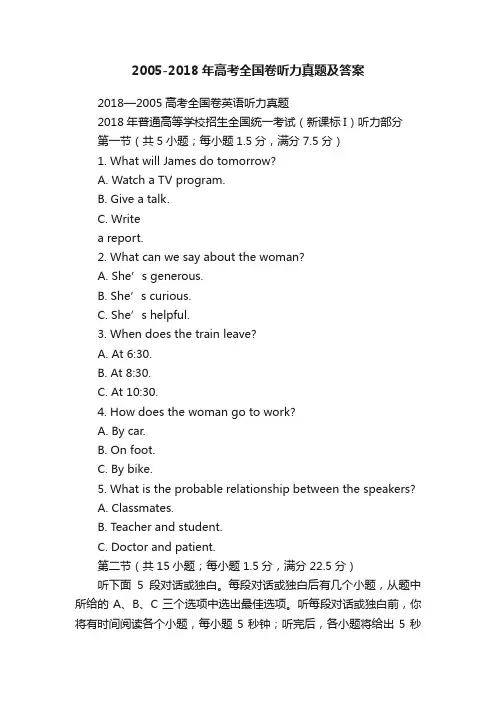
2005-2018年高考全国卷听力真题及答案2018—2005高考全国卷英语听力真题2018年普通高等学校招生全国统一考试(新课标I)听力部分第一节(共5小题;每小题1.5分,满分7.5分)1. What will James do tomorrow?A. Watch a TV program.B. Give a talk.C. Writea report.2. What can we say about the woman?A. She’s generous.B. She’s curious.C. She’s helpful.3. When does the train leave?A. At 6:30.B. At 8:30.C. At 10:30.4. How does the woman go to work?A. By car.B. On foot.C. By bike.5. What is the probable relationship between the speakers?A. Classmates.B. Teacher and student.C. Doctor and patient.第二节(共15小题;每小题1.5分,满分22.5分)听下面5段对话或独白。
每段对话或独白后有几个小题,从题中所给的A、B、C三个选项中选出最佳选项。
听每段对话或独白前,你将有时间阅读各个小题,每小题5秒钟;听完后,各小题将给出5秒钟的作答时间。
每段对话或独白读两遍。
听第6段材料,回答第6、7题。
6. What does the woman regret?A. Giving up her research.B. Dropping out of college.C. Changing her major.7. What is the woman interested in studying now?A. Ecology.B. Education.C. Chemistry.听第7段材料,回答第8、9题。
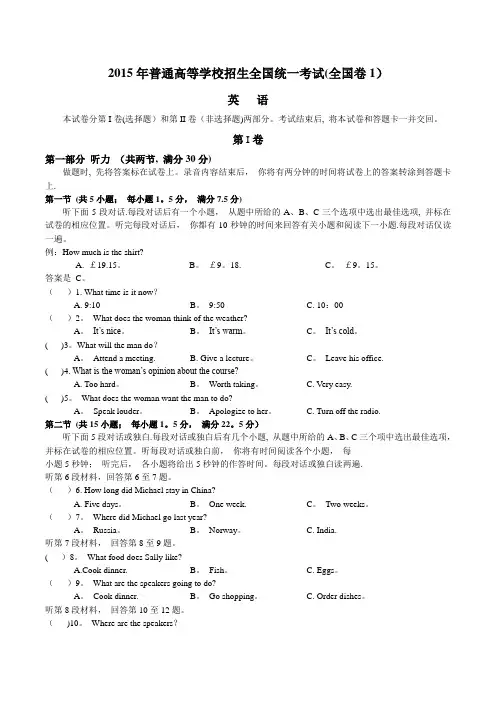
2015年普通高等学校招生全国统一考试(全国卷1)英语本试卷分第I卷(选择题)和第II卷(非选择题)两部分。
考试结束后, 将本试卷和答题卡一并交回。
第I卷第一部分听力(共两节, 满分30分)做题时, 先将答案标在试卷上。
录音内容结束后,你将有两分钟的时间将试卷上的答案转涂到答题卡上.第一节(共5小题;每小题1。
5分,满分7.5分)听下面5段对话.每段对话后有一个小题,从题中所给的A、B、C三个选项中选出最佳选项, 并标在试卷的相应位置。
听完每段对话后,你都有10秒钟的时间来回答有关小题和阅读下一小题.每段对话仅读一遍。
例:How much is the shirt?A. £19.15。
B。
£9。
18. C。
£9。
15。
答案是C。
()1. What time is it now?A. 9:10 B。
9:50 C. 10:00()2。
What does the woman think of the weather?A。
It’s nice。
B。
It’s warm。
C。
It’s cold。
( )3。
What will the man do?A。
Attend a meeting. B. Give a lecture。
C。
Leave his office.( )4. What is the woman’s opinion about the course?A. Too hard。
B。
Worth taking。
C. Very easy.( )5。
What does the woman want the man to do?A。
Speak louder。
B。
Apologize to her。
C. Turn off the radio.第二节(共15小题;每小题1。
5分,满分22。
5分)听下面5段对话或独白.每段对话或独白后有几个小题, 从题中所给的A、B、C三个项中选出最佳选项,并标在试卷的相应位置。
听每段对话或独白前,你将有时间阅读各个小题,每小题5秒钟;听完后,各小题将给出5秒钟的作答时间。
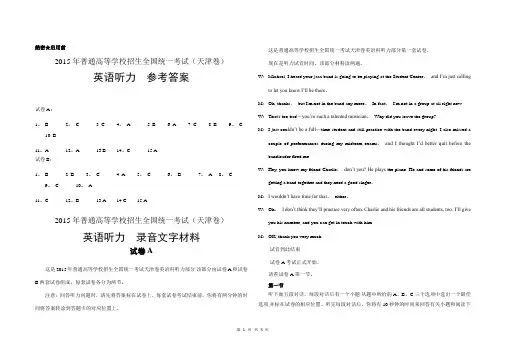
绝密★启用前2015年普通高等学校招生全国统一考试(天津卷)英语听力参考答案试卷A:1。
B 2。
C 3. C 4。
A 5. B 6. A 7. C 8. B 9。
C10. B11。
A 12。
A 13.B 14。
C 15.A试卷B:1。
B 2. B 3。
C 4. A 5。
C 6。
B 7。
A 8。
C 9。
C 10。
A11。
C 12。
B 13.A 14.C 15.A2015年普通高等学校招生全国统一考试(天津卷)英语听力录音文字材料试卷A这是2015年普通高等学校招生全国统一考试天津卷英语科听力部分.该部分由试卷A和试卷B两套试卷组成,每套试卷各分为两节。
注意:回答听力问题时,请先将答案标在试卷上。
每套试卷考试结束前,你将有两分钟的时间将答案转涂到答题卡的对应位置上。
这是普通高等学校招生全国统一考试天津卷英语科听力部分第一套试卷。
现在是听力试音时间。
该部分材料读两遍。
W:M ichael, I heard your jazz band is going to be playing at the Student Center,and I’m just calling to let you know I’ll be there。
M:Oh, thanks,but I'm not in the band any more。
In fact,I'm not in a group at all right now. W: That's too bad-you’re such a talented musician。
Why did you leave the group?M:I just cou ldn’t be a full—time student and still practice with the band every night. I also missed a couple of performances during my midterm exams,and I thought I’d better quit before the bandleader fired me.W:H ey, you know my friend Charlie,don’t you? He plays the piano. He and some of his friends are getting a band together and they need a good singer。
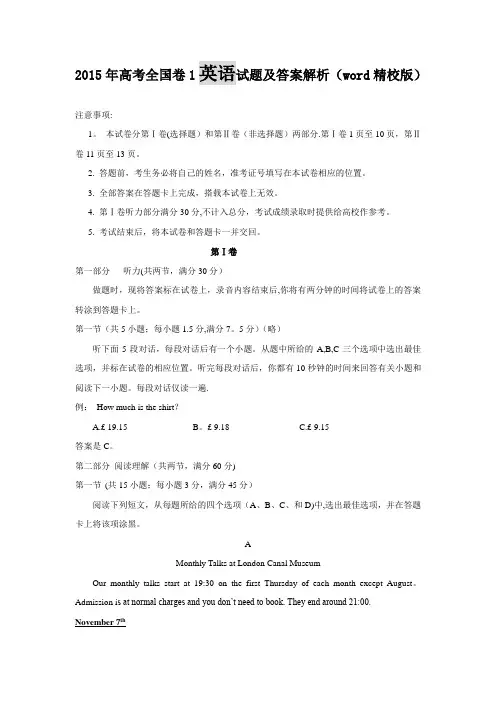
2015年高考全国卷1英语试题及答案解析(word精校版)注意事项:1。
本试卷分第Ⅰ卷(选择题)和第Ⅱ卷(非选择题)两部分.第Ⅰ卷1页至10页,第Ⅱ卷11页至13页。
2. 答题前,考生务必将自己的姓名,准考证号填写在本试卷相应的位置。
3. 全部答案在答题卡上完成,搭载本试卷上无效。
4. 第Ⅰ卷听力部分满分30分,不计入总分,考试成绩录取时提供给高校作参考。
5. 考试结束后,将本试卷和答题卡一并交回。
第Ⅰ卷第一部分听力(共两节,满分30分)做题时,现将答案标在试卷上,录音内容结束后,你将有两分钟的时间将试卷上的答案转涂到答题卡上。
第一节(共5小题;每小题1.5分,满分7。
5分)(略)听下面5段对话,每段对话后有一个小题。
从题中所给的A,B,C三个选项中选出最佳选项,并标在试卷的相应位置。
听完每段对话后,你都有10秒钟的时间来回答有关小题和阅读下一小题。
每段对话仅读一遍.例:How much is the shirt?A.£ 19.15 B。
£ 9.18 C.£ 9.15答案是C。
第二部分阅读理解(共两节,满分60分)第一节(共15小题;每小题3分,满分45分)阅读下列短文,从每题所给的四个选项(A、B、C、和D)中,选出最佳选项,并在答题卡上将该项涂黑。
AMonthly Talks at London Canal MuseumOur monthly talks start at 19:30 on the first Thursday of each month except August。
Admission i s at normal charges and you don’t need to book. They end around 21:00.November 7thThe Canal Pioneers,by Chris Lewis。
James Brindley is recognized as one of the leading early canal engineers。
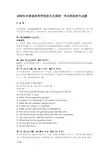
2005年普通高等学校招生全国统一考试英语招生试题江苏卷本试卷分第一卷(选择题)和第二卷(非选择题)两部分。
第一卷从第1页至第14页,第二卷从第15页至第16页。
考试结束后,将本试卷和答题卡一并交回。
考试时间120分钟。
第一卷(选择题共115分)注意事项:1. 作答第一卷前,请考生务必将自己的姓名、考试证号用书写黑色字迹的0. 5毫米的签字笔填写在答题卡上,并认真核对监考员所粘贴的条形码上的姓名、考试证号是否正确。
2. 第一卷答案必须用2B铅笔填涂在答题卡上,在其他位置作答一律无效。
每小题选出答案后,用2B铅笔把答题卡上对应题目的答案标号涂黑。
如需改动,用橡皮擦干净后,再选涂其他答PAN>2B第一部分听力(共两节,满分30分)做题时,先将答案标在试卷上。
录音内容结束后,你将有两分钟的时间将试卷上的答案转涂到答题卡上。
第一节(共5小题;刨、题1. 5分,满分7. 5分)听下面5段对话。
每段对话后有一个小题,从题中所给的A、B、C三个选项中选出最佳选项,并标在试卷的相应位置。
听完每段对话后,你都有10秒钟的时间来回答有关小题和阅读下一小题。
每段对话仅读一遍。
例:How much is the shirt?A. A.£19. 15.B. £9. 15.C. £9. 18.答案是B。
1. How much will the woman pay if she buys two skirts?A. S18.B. $19.C. $202. What will the speakers discuss?A. A report.B. A computer.C. A report on computer.3. What are the speakers talking about?A. A child.B. A room.C. A present.4. What can we learn from this conversation?A. The woman does not get along well with the man.B. The woman does not get along well with her roommate.C. The man will talk with the woman s roommate.5. Where are the two speakers now?A. On the first floor.B. On the fourth floorC. On the fifth floor.第二节(共15小题;每小题1. 5分,满分22. 5分)听下面5段对话。
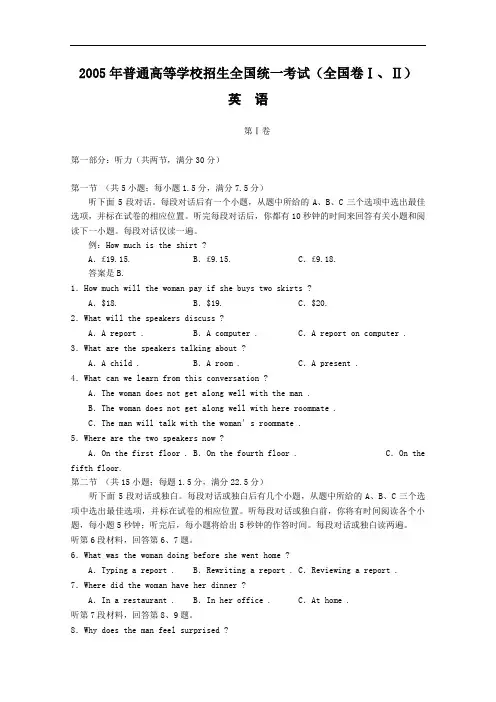
2005年普通高等学校招生全国统一考试(全国卷Ⅰ、Ⅱ)英语第Ⅰ卷第一部分:听力(共两节,满分30分)第一节(共5小题;每小题1.5分,满分7.5分)听下面5段对话。
每段对话后有一个小题,从题中所给的A、B、C三个选项中选出最佳选项,并标在试卷的相应位置。
听完每段对话后,你都有10秒钟的时间来回答有关小题和阅读下一小题。
每段对话仅读一遍。
例:How much is the shirt ?A.£19.15. B.£9.15. C.£9.18.答案是B.1.How much will the woman pay if she buys two skirts ?A.$18. B.$19. C.$20.2.What will the speakers discuss ?A.A report . B.A computer . C.A report on computer . 3.What are the speakers talking about ?A.A child . B.A room . C.A present .4.What can we learn from this conversation ?A.The woman does not get along well with the man .B.The woman does not get along well with here roommate .C.T he man will talk with the woman’s roommate .5.Where are the two speakers now ?A.On the first floor . B.On the fourth floor . C.On the fifth floor.第二节(共15小题;每题1.5分,满分22.5分)听下面5段对话或独白。

2015年全国各省英语⾼考试卷全套(含答案)⽬录2015年普通⾼等学校招⽣全国统⼀考试各地英语科试题及答案2015年普通⾼等学校招⽣全国统⼀考试(新课标I)英语试题 (5)(河北、河南、⼭西、江西、⼭东)2015年普通⾼等学校招⽣全国统⼀考试(新课标I)英语试题参考答案 (187)2015年普通⾼等学校招⽣全国统⼀考试(新课标II)英语试题 (15)(⽢肃、⼴西、贵州、⿊龙江、吉林、辽宁、内蒙古、宁夏、青海、西藏、新疆、云南、海南) 2015年普通⾼等学校招⽣全国统⼀考试(新课标II)英语试题参考答案 (188)2015年普通⾼等学校招⽣全国统⼀考试(北京卷)英语试题 (25)2015年普通⾼等学校招⽣全国统⼀考试(北京卷)英语试题参考答案 (188)2015年普通⾼等学校招⽣全国统⼀考试(天津卷)英语试题 (39)2015年普通⾼等学校招⽣全国统⼀考试(天津卷)英语试题参考答案 (189)2015年普通⾼等学校招⽣全国统⼀考试(上海卷)英语试题 (49)2015年普通⾼等学校招⽣全国统⼀考试(上海卷)英语试题参考答案 (190)2015年普通⾼等学校招⽣全国统⼀考试(⼴东卷)英语试题 (63)2015年普通⾼等学校招⽣全国统⼀考试(⼴东卷)英语试题参考答案 (191)2015年普通⾼等学校招⽣全国统⼀考试(江苏卷)英语试题 (75)2015年普通⾼等学校招⽣全国统⼀考试(江苏卷)英语试题参考答案 (192)2015年普通⾼等学校招⽣全国统⼀考试(安徽卷)英语试题 (89)2015年普通⾼等学校招⽣全国统⼀考试(安徽卷)英语试题参考答案 (193)2015年普通⾼等学校招⽣全国统⼀考试(浙江卷)英语试题 (99)2015年普通⾼等学校招⽣全国统⼀考试(浙江卷)英语试题参考答案 (194)2015年普通⾼等学校招⽣全国统⼀考试(浙江卷)⾃选模块英语部分试题 (111)2015年普通⾼等学校招⽣全国统⼀考试(浙江卷)⾃选模块英语部分试题参考答案 (195)2015年普通⾼等学校招⽣全国统⼀考试(福建卷)英语试题 (113)2015年普通⾼等学校招⽣全国统⼀考试(福建卷)英语试题参考答案 (195)2015年普通⾼等学校招⽣全国统⼀考试(湖南卷)英语试题 (127)2015年普通⾼等学校招⽣全国统⼀考试(湖南卷)英语试题参考答案 (203)2015年普通⾼等学校招⽣全国统⼀考试(湖北卷)英语试题 (139)2015年普通⾼等学校招⽣全国统⼀考试(湖北卷)英语试题参考答案 (204)2015年普通⾼等学校招⽣全国统⼀考试(四川卷)英语试题 (153)2015年普通⾼等学校招⽣全国统⼀考试(四川卷)英语试题参考答案 (205)2015年普通⾼等学校招⽣全国统⼀考试(重庆卷)英语试题 (165)2015年普通⾼等学校招⽣全国统⼀考试(重庆卷)英语试题参考答案 (206)2015年普通⾼等学校招⽣全国统⼀考试(陕西卷)英语试题 (175)2015年普通⾼等学校招⽣全国统⼀考试(陕西卷)英语试题参考答案 (207)2015年普通⾼等学校招⽣全国统⼀考试各地英语科试题2015年普通⾼等学校招⽣全国统⼀考试(新课标I)英语注意事项:1. 本试卷分第Ⅰ卷(选择题)和第Ⅱ卷(⾮选择题)两部分。
2005年高考英语听力全-全国卷I(十五)1. How much will the woman pay if she buys two skirts?A. $18.B. $19.C. $20.2. What will the speakers discuss?A. A report.B. A computer.C. A report on computer.3. What are the speakers talking about?A. A child.B. A room.C. A present.4. What can we learn from this conversation?A. The woman does not get along well with the man.B. The woman does not get along well with her roommate.C. The man will talk with the woman's roommate.5. Where are the two speakers now?A. On the first floor.B. On the fourth floor.C. On the fifth floor.六(6-7)6. What was the woman doing before she went home?A. Typing a report.B. Rewriting a report.C. Reviewing a report.7. Where did the woman have her dinner?A. In a restaurant.B. In her office.C. At home.七(8-9)8. Why does the man feel surprised?A. The woman has found a new job.B. The woman doesn't feel like leaving.C. The woman disagrees with him.9. What does the woman say about her department?A. There is a lack of trust.B. There are serious problems.C. There is too much pressure.八(10-12)10. What are the speakers talking about?A. Popular sports events.B. TV programs people like best.C. Things people do after work.11. How did the woman do the research?A. She talked to people.B. She sent letters to people.C. She collected information from newspapers.12. What do most people do in their spare time?A. Go to moviesB. Read books.C. Watch TV.九(13-16)13. Where does this conversation take place?A. At the airport.B. In a restaurant.C. On the street.14. Why does the woman like San Francisco?A. It has less traffic.B. It has the best food and music.C. People there are friendlier.15. Where does the woman come from?A. Pennsylvania.B. San Francisco.C. China.16. What does the woman think of the man's English?A. Excellent.B. Acceptable.C. Strange.十(17-20)17. How many people are there in the woman's family?A. Three.B. Four.C. Five.18. What did the children think about having dinner together at home?A. They thought it was funny.B. They disliked the idea at first.C. They preferred eating with friends.19. How often did the family finally decide to have meals together?A. Every Sunday.B. Twice a week.C. Three times a week.20. Who finally set the time for these family dinners?A. The children.B. The father.C. The woman speaker.2005全国I(十五)录音原文Text 1W: Very nice skirts. How much are they?M: $ 10 each and $ 1 off if people buy two. They're on sale.Text 2M: I know you want to talk about this report. But I'd like to talk about my new computer.W: Let's keep to the point. We can talk about that later. All right?M: OK.Text 3W: Bill, that is a lovely painting in your living-room.M: I' m glad you like it. It’s a Christmas gift from my son.W: Well, it's beautiful. Your son has very good taste.Text 4M: So how is your new roommate?W: She really makes me angry.M: What happened?W: She's always making loud noises at midnight. When I remind her, she's always rude.Text 5W: Excuse me, I'm looking for Mr Tang.M: Oh, he is not on this floor. He is on the fourth floor. Go down the stairs and turn left.Text 6M: Did you finish typing that report?W: Yes, I did, but I worked late.M: But it must be a long report, I guess.W: Exactly. Twelve pages. I spent three hours on it.M: By the way, what time did you go home?W: I left the office at nine o'clock. I got home at ten.M: What did have for dinner?W: I sent out for a sandwich and ate at my desk.Text 7M: Fikky, what's going on? Freggis just told me that you're going to be leaving us.W: Yes, I really feel bad out of it. But B. N. D. came up with really good offer.M: Well, I didn't know you were going to look for a new job.W: Well, just between you and me. I think we have some real problems in this department. Don't get me wrong. It has nothing to do with you, Frank. Everybody says you are an excellent manager.M: Problems, what problems? Do we have time to talk about it?Text 8W: You know I just finished some very interesting research for the newspaper about things people do in their spare time.M: Really? What did you learn?W: Well, I talked to 20 people and 19 of them watch TV.M: That's interesting. I never watch it, do you?W: Not much. Anyway, about half of them, 9 people, play some kind of sport.M: I'm not surprised. People are getting more exercise these days.W: Yes, a few of them go to movies.M: Mm, I do, too.W: But here is the most interesting result: only one of them reads.M: That's terrible.Text 9M: Excuse me, do you mind if I sit here?W: No, not at all. Go ahead.M: Thank you.W: Are you going somewhere or meeting someone?M:I am on my way to Washington. And you?W:I am on my way to San Francisco.M: Really? I think San Francisco is probably the most exciting city in the U-S.W: So do I. No other city has as many good restaurants or as much good music.M: Is San Francisco your hometown?W:I am from a very small town in Pennsylvania. I wouldn't want to live there again, either. I don't like to live in a small town very much.M: Neither do I. But small towns have their advantages: less traffic —W: And friendlier people. You know, I'm beginning to feel homesick. By the way, where are your from?M: China.W: China? But you speak English like a native speaker. I didn't have any idea.M: Oh, excuse me. It's time for my flight. Well, it's been nice talking with you.W: You, too. Bye!Text 10M: Could you suggest some ways to bring family members closer together?W: Well, I feel it is very important for families to have regular meals together. One of my good childhood memories was dinner with my parents and two sisters. Because my husband and I both worked and our three children were busy with their studies, we seldom had a chance to get together as a family. But we thought it would be possible for us to sit down and enjoy meals together every week. First we tried setting fixed days: Mondays, Wednesdays, and Fridays. But almost everyone was unhappy. Then my son had the idea that everyone told his or her most convenient days and I would choose the two best days. For a while the children were still unhappy with the idea. They said theywould rather spend the time with their friends playing sports. Gradually, though, they began to see the evenings together as interesting and helpful. We loved a lot. We made plans for trips. We discussed each other’s problems. After a couple of months anyone who had to miss a family meal felt regretful. And now we all feel than we have been able to build stronger relationships within the family that we had before.十五、1. BACBC 6. ABACC 11. ACABA 16. ACBBC。
听力录音材料Text 1W: What time is your train leaving?M: It leaves at ten. I’ve got fifty minutes left.W: You’d better hurry, or you won’t be able to catch it.Text 2M: Nice weather we’re having, don’t you think?W: No. It is too cold.M: I think it is just right.W: I’d prefer it a few degrees warmer.Text 3M: Now, let’s stop talking and get going. I need to be in my office in fifteen minutes, or I’ll be late for a meeting.W: Okay, bye.Text 4M: This course is really difficult.W: I don’t think it’s all that bad. And we’ll benefit a lot from it.M: So, you’re taking it too?W: That’s true.Text 5W: Could you turn that off? I can’t hear myself think.M: What?W: The radio.M: Oh! Sorry.Text 6W: Hi Michael! I heard you just came back from a holiday.M: Yes. I stayed for a week in China, and five days in India.W: You do travel a lot, don’t you? Last year, you went to Norway, right?M: Well, I’ve been to quite some countries, but not yet to Norway. Last summer, I toured Russia for two weeks.Text 7M: Sally, do you like seafood?W: Yes, of course.M: Is there anything you especially like?W: Well, I really don’t know. I can never remember the names.M: Okay. Is there any food you don’t eat?W: Well, I don’t eat chicken. And I don’t like eggs, either. B ut I like all kinds of fish and vegetables.M: Then let’s look at the menu and see what they’ve got for us.Text 8M: You look pale, Stephanie. What’s wrong?W: I don’t feel good. I have a bad headache. In fact, I haven’t got much sleep this past week, an d I feel really tired.M: Why don’t you go to see a doctor?W: Yeah, I think I should. But I have a report due tomorrow. Ms. Jenkins needs it for the board meeting next Monday.M: Well, it’s Wednesday today. Why don’t you talk to Ms. Jenkins, and ask if yo u can hand it in on Friday morning?W: Maybe I should try. I guess I just need a good sleep. Thanks, George.M: If you need any help with the report, just let me know.Text 9W: Anything interesting in the paper today, dear?M: Well, yeah. There are a few here that might interest us. Here’s one for just four hundred dollars. It only has one bedroom, but it sounds nice, near Lake Street.W: Yeah. Let me see what the cheapest two-bedroom apartment is. Oh, here’s one on Market Street. It’s a real bargain. Only three hundred and fifty dollars. But it doesn’t have any furniture. M: Well, it costs a lot to buy all the furniture.W: Oh, here’s another one for just over four hundred dollars. This sounds very interesting! It’s on South Street. That’s a nice area.M: Yes, it’s quiet. Did you say two bedrooms?W: Yes, at four hundred and fifteen dollars.M: Why don’t we go and have a look?W: Okay, I’ll give them a call.Text 10Look at this picture. It’s the London Tea Trade Centre. As you can see, it is on the north bank of the river Thames. It is the center of an important industry in the everyday lives of the British people. Tea is the British national drink. Every man, woman, and child over ten years of age has on average over four cups a day. Or some one thousand, five hundred cups annually. About thirty percent of the world’s exports of tea makes its way to London. And Britain is by far the largest importer of tea in the world. Now, in the second picture, you can see how tea is tasted in the Tea Trade Centre before it is sold. Here, different types of tea are tasted by skilled tea tasters, before they’re sold at each week’s tea sale. It’s amazing to see them at work. Over a hundred kinds of tea are laid out in a line on long tables. The tasters generally taste teas with milk, since that is how the majority of British people drink their tea. The tasters move down the line with surprising speed, tasting from a spoon and deciding what is a fair price for each tea. After that, they…听力答案:1-5 ACABC 6-10 BABCB 11-15 ABCAB 16-20 CBAAC。
试题类型:A 2015年普通高等学校招生全国统一考试(新课标I)英语第Ⅰ卷第一部分听力(共两节,满分30分)做题时,先将答案标在试卷上,录音内容结束后,你将有两分钟的时间将试卷上的答案转涂到答题卡上。
第一节(共5小题;每小题1.5分,满分7.5分)听下面5段对话,每段对话后有一个小题。
从题中所给的A、B、C三个选项中选出最佳选项,并标在试卷的相应位置。
听完每段对话后,你都有10秒钟的时间来回答有关小题和阅读下一小题。
每段对话仅读一遍。
例:How much is the shirt?£ 19.15 B.£ 9.18 C.£ 9.15答案是C。
1. What time is it now?A.9:10B.9:50C.10:002. What does the woman think of the weather?A. It’s nice.B. It’s warmC. It’s cold3. What will the man do?A. Attend a meeting.B. Give a lectureC. Leave his office.4. What is the woman’s opinion about the course?A. Too hard.B. Worth taking.C. Very easy.5. What does the woman want the man to do?A. Speak louder.B. Apologize to her.C. Turn off the radio.第二节(共15小题;每小题1.5分,满分22.5分)听下面5段对话或独白。
每段对话或独白后有几个小题,从题中所给的A、B、C三个选项中选出最佳选项,并标在试卷的相应位置。
听每段对话或独白前,你将有时间阅读各个小题,每小题5秒钟;听完后,各小题将给出5秒钟的作答时间。
2005年普通高等学校招生全国统一考试(山东卷) 英 语
第I卷(共115分) 第一部分:听力(共两节,满分30分) 做题时,先将答案标在试卷上。录音内容结束后,你将有两分钟的时间将试卷上的答案转涂到答题卡上。 第一节 (共5小题;每小题1.5分,满分7.5分) 听下面5段对话。每段对话后有一个小题,从题中所给的A、B、C三个选项中选出最佳选项,并标在试卷的相应位置。听完每段对话后,你都有10秒钟的时间来回答有关小题和阅读下一小题。每段对话仅读一遍。 例:How much is the shirt ? A.£19.15. B.£9.15. C.£9.18. 答案是B. 1.How much will the woman pay if she buys two skirts ? A.$18. B.$19. C.$20. 2.What will the speakers discuss ? A.A report . B.A computer . C.A report on computer . 3.What are the speakers talking about ? A.A child . B.A room . C.A present . 4.What can we learn from this conversation ? A.The woman does not get along well with the man . B.The woman does not get along well with here roommate . C.The man will talk with the woman’s roommate . 5.Where are the two speakers now ? A.On the first floor . B.On the fourth floor . C.On the fifth floor. 第二节 (共15小题;每题1.5分,满分22.5分) 听下面5段对话或独白。每段对话或独白后有几个小题,从题中所给的A、B、C三个选项中选出最佳选项,并标在试卷的相应位置。听每段对话或独白前,你将有时间阅读各个小题,每小题5秒钟;听完后,每小题将给出5秒钟的作答时间。每段对话或独白读两遍。 听第6段材料,回答第6、7题。 6.What was the woman doing before she went home ? A.Typing a report . B.Rewriting a report . C.Reviewing a report . 7.Where did the woman have her dinner ? A.In a restaurant . B.In her office . C.At home . 听第7段材料,回答第8、9题。 8.Why does the man feel surprised ? A.The woman has found a new job . B.The woman doesn’t feel like leaving . C.The woman disagrees with him . 9.What does the woman say abut her department ? A.thee is a lack of trust . B.There are serious problems . C.There is too much pressure . 听第8段材料,回答第10至12题。 10.What are the speakers talking about ? A.Popular sports events . B.TV programs people like best . C.Things people do after work . 11.How did the woman do the research ? A.She talked to people . B.She sent letters to people . C.She collected information from newspapers . 12.What do most people do in their spare time ? A.Go to movies . B.Read books . C.Watch TV. 听第9段材料,回答第13至16题。 13.Where does this conversation take place ? A.At the airport . B.In a restaurant . C.On the street . 14.Why does the woman like San Francisco ? A.It has less traffic . B.It has the best food and music C.People there are friendlier . 15.Where does the woman come from ? A.Pennsylvania . B.San Francisco . C.China . 16.What does the woman think of the man’s English ? A.Excellent . B.Acceptable . C.Strange . 听第10段材料,回答第17至20题。 17.How many people are there in the woman’s family ? A.Three . B.Four . C.Five . 18.What did the children think about having dinner together at home ? A.They thought it was funny . B.They disliked the idea at first . C.They preferred eating with friends . 19.How often did the family finally decide to have meals together ? A.Every Sunday . B.Twice a week . C.Three times a week . 20.Who finally set the time for these family dinners ? A.The children . B.The father . C.The woman speaker . 第二部分:英语知识运用(共两节, 满分45分) 第一节:单项填空(共15小题,每小题1分,满分15分) 从A、B、C、D四个选项中,选出可以填入空白处的最佳选项,并在答题卡上将该项涂黑。 例:It is generally considered unwise to give a child he or she wants . A.however B.whatever C.whichever D.whenever 答案是B. 21. --- Have you been to New Zealand? --- No. I’d love to, _______. A. too B. though C. yet D. either 22. --- Could you do me a favor and take these books to my office? --- Yes, _____ . A. for pleasure B. I could C. my pleasure D. with pleasure. 23. I knew _____ John Lemon, but not _____ famous one. A. / ; a B. a; the C. / ; the D. the ; a 24. It was some time _____ we realized the truth. A. when B. until C. since D. before 25. With more forests being destroyed, huge quantities of good earth _____ each year. A. is washing away B. is being washed away C. are washing away D. are being washed away 26. The shopkeeper did not want to sell for _____ what he thought was not enough. A. where B. how C. what D. which 27. Oil prices have been risen by 32 percent since the start of the year. _____ a record US $ 57.65 a barrel on April 4. A. have reached. B. reaching C. to reach D. to be reaching 28. Mr. Smith owns _____ collection of coins than anyone else I have ever met. A. larger B. a larger C. the large D. a large 29. Modern plastics can _____ very high and very low temperatures. A. stand B. hold C. carry D. support 30. He was educated at a local grammar school, _____ he went on to Cambridge. A. from which B. after that C. after which D. from this 31. ---- ______ that he managed to get the information? --- Oh, a friend of his helped him. A. Where was it B. What was it C. How was it D. Why was it 32.What shall we use for power when all the oil in the world has _____ ? A. given out B. put out C. held up D. used up 33. --- Let’s go to a movie after work, OK? --- ________. A. Not at all. B. Why not C. Never mind D. What of it 34. He paid a seat, when he ____ have entered free. A. could B. would C. must D. need 35. The country life he was used to _____ greatly since 1992. A. change B. has changed C. changing D. have changed 第二节 完型填空(共20小题;每小题1.5分,满分30分) 阅读下面短文,撑握其大意,然后从36—55各题所给的四个选项(A、B、C和D)中,选出最佳选项 My sister and I grew up in a little village in England. Our father was a studying 36 , but I always knew he was 37 . He never criticized us, but used 38 to bring out our best. He’d say, “ If you pour water on flowers, they flourish. If you don’t give them water, they die.” I 39 as a child said something 40 about somebody, and my father said, “ 41_ time you say something unpleasant about somebody else, it’s a reflection of you.” He explained that if I looked for the best 42 people, I would get the best 43 . From then on I have always tried to 44 the principle in my life and later in running my company. Dad’s also always been very 45 . At 15, I started a magazine. It was 46 a great deal of my time, and the headmaster of my school gave me a 47 ; stay in school or leave to work on my magazine. I decided to leave, and Dad tried to sway me from my decision, 48 my good father would. When he realized I had made up my mind, he said, “ Bichard, when I was 23, my dad 49 me to go into law. And I have _50 regretted. I wanted to be a biologist, 51 I didn’t pursue my 52 . You know what you want. Go fulfill it.” As 53 turned out, my little publication went on to become Student, a national _54 for young people in the U. K . My wife and I have two children, and I’d like to think we are bringing them up in the same way Dad 55 me. 36. A. biologist B. manager C. lawyer D. gardener 37. A. strict B. honest C. special D. learned 38. A. praise B. courage C. power D. warmth 39. A. think B. imagine C. remember D. guess 40. A. unnecessary B. unkind C. unimportant D. unusual 41. A. Another B. Some C. Any D. Other 42. A. on B. in C. at D. about
2005年普通高等学校招生全国统一考试(全国卷Ⅲ)英语第一部分:英语知识运用(共三节,满分50分)第一节语音知识(共5小题;每小题1分,满分5分)从A、B、C、D四个选项中,找出其划线部分与所给单词的划线部分读音相同的选项。
1.grade A.temperature B.classmate C.necklace D.fortunate 2.south A.courage B.soup C.southern D.trousers 3.smooth A.feather B.tooth C.thief D.warmth 4.official A.concert B.century C.coast D.ocean 5.surprise A.performance B.further C.work D.nurse第二节语法和词汇知识(共15小题,每小题1分,满分15分)从A、B、C、D四个选项中,选出可以填入空白处的最佳选项。
6.-Is your headache getting_____________? -No, it’s worse.A.better B.bad C.less D.well7.Listen to the two girls by the window. What language ___________?A.did they speak B.were they speakingC.are they speaking D.have they been speaking8.-Did you tell Julia about the result? -Oh, no, I forgot. I ________ her now.A.will be calling B.will call C.call D.am to call9.I always take something to read when I go to the doctor’s __________ I have to wait.A.In case B.so that C.in order D.as if10.We hadn’t planned to meet. We met _________ chance.A.of B.in C.for D.by11.The poor young man is ready to accept ___________ help he can get.A.whichever B.however C.whatever D.whenever12.-Would you like some more tea? -___________, please.A.No more B.Just a little C.I’ve had enough D.Yes, I would 13.The do ctor advised Vera strongly that she should take a holiday, but _______ didn’t help.A.it B.she C.which D.he14.Before building a house, you will have to _________ the government’s permission.A.get from B.follow C.receive D.ask for15.If you go by _________ train, you can have quite a comfortable journey, but make sure you get __________ fast one.A.the; the B.不填;a C.the; a D.不填;不填16.Mary never does any reading in the evening, _________.A.so does John B.John does too C.John doesn’t too D.nor does John 17._________, the more expensive the camera, the better its quality.A.General speaking B.Speaking generalC.Generally speaking D.Speaking generally18.While watching television, __________.A.the doorbell rang B.the doorbell ringsC.we heard the doorbell ring D.we heard the doorbell rings19.John, look at the time. ___________ you play the piano at such a late hour?A.Must B.Can C.May D.Need20.“You can’t catch me!” Janet shouted, __________ away.A.run B.running C.to run D.ran第二节完形填空(共20小题;每小题1.5分,满分30分)阅读下面短文,从短文后所给各题的四个选项(A、B、C和D)中,选出可以填入空白处的最佳选项。
2005-2015高考英语全国卷听力真题 2005年高考英语听力全国卷I 第一节(共5小题;每小题1. 5分,满分7. 5分) 1. How much will the woman pay id she buys two skirts? A. $18 B. $ C. $20 2. What will the speakers discuss? A. A report B. A computer C. A report on computer 3. What are the speakers talking about? A. A child B. A room C. A present 4. What can we learn from this conversation? A. The woman does not get along well with the man. B. The woman does not get along well with her roommate. C. The man will talk with the woman’s roommate. 5. Where are the two speakers now? A. On the first floor B. On the fourth floor C. On the fifth floor 第二节(共15小题;每小题1. 5分,满分22. 5分) 听下面一段对话,回答第6和第7两个小题。 6. What was the woman doing before she went A. Typident-count: 2.0; mso-linng a report B. Rewriting a report C. Reviewing a report 7. Where did the woman have her dinner? A. In a restaurant B. In her office C. At home 听下面一段对话,回答第8和第9两个小题。 8. Why does the man feel surprised? A. The woman has found a new job. B. The woman doesn’t feel like leaving. C. The woman disagrees with him. 9. What does the woman say about her department? A. There is a lack of trust. B. There are serious problems. C. There is too much pressure. 听下面一段对话,回答第10和第12三个小题。 10. What are the speakers talking about? A. Popular sports events. B. TV programs people like best. C. Things people do after work. 11. How did the woman do the research? A. She talked to people. B. She sent letters to people C. She collected information from newspapers 12. What do most people do in their spare time? A. Go to movies B. Read books C. Watch TV 听下面一段对话,回答第13和第16四个小题。 13. Where does this conversation take place? A. At the airport B. In a restaurant C. On the street 14. Why does the woman like San Francisco? A. It has less traffic B. It has the best food and music C. People there are friendlier 15. Where does the woman come from? A. Pennsylvania B. San Francisco C. China 16. What does the woman think of the man’s English? A. Excellent B. Acceptable C. Strange 听下面一段对话,回答第17和第20四个小题。 17. How many people are in the woman’s family? A. Three B. Four C. Five 18. What did the children think about having dinner together at home? A. They thought it was funny B. They disliked the idea at first C. They preferred eating with friends 19. How often did the family finally decide to have meals together? A. Every Sunday B. Twice a week C. Three times a week. 20. Who finally set the time for these family dinners? A. The children B. The father C. The woman speaker 2006年高考英语听力及答案(全国卷1) 第一节(共5小题;每小题1.5分,满分7.5分) 1.How much will the man pay for the tickets? A.£7.5. B.£15. C.£50. 2.Which is the right gate for the man’s flight? A.Gate 16. B.Gate 22. C.Gate 25. 3.How does the man feel about going to school by bike? A.Happy. B.Tired. C.Worried. 4.When can the woman get the computers? A.On Tuesday. B.On Wednesday. C.On Thursday. 5.What does the woman think of the shirt for the party? A.The size is not large enough. B.The material is not good. C.The color is not suitable. 第二节(共15小题;每小题1.5分,满分22.5分) 听第6段材料,回答第6、7题。 6.What can we learn about Mr.Brown? A.He is in his office. B.He is at a meeting. C.He is out for a meal. 7.What will the man probably do next? A.Call back. B.Come again. C.Leave a message. 听第7段材料,回答第8、9题。 8.What kind of room does the man want to take? A.A single room. B.A double room. C.A room for three. 9.What does the man need to put in the from? A.Telephone and student card numbers. B.Student card number and address. C.Address and telephone number. 听第8段材料,回答第10至12题。 10.What is the relationship between the speakers? A.Fellow clerks. B.Boss and secrecary. C.Customer and salesperson. 11.What does the man like about his job? A.Living close to the office. B.Chances to go abroad. C.Nice people to work with. 12.What do we know about the woman? A.She likes traveling. B.She is new to the company. C.She works in public relations. 听第9段材料,回答第13至16题。 13.When will the visitors come? A.In March. B.In April. C.In May. 14.How many visitors are coming? A.8. B.10. C.12. 15.What will the visitors do on the second day? A.Go to party. B.Visit schools. C.Attend a lecture. 16.Where will the visitors go on the final day? A.To London. B.To Scotland. C.To the coast. 听第10段材料,回答第17至20题。 17.What is the first word the baby tried to say? A.Truck. B.OK. C.Duck. 18.How old was the baby when he learned to say that word correctly? 19.What did the father do when the baby screamed that word at the airport? A.He corrected the baby. B.He tried to stop the baby. C.He did himself somewhere. 20.Why did the mother pretend not to know the baby? A.She got angry with the father. B.She was frightened by the noise. C.She felt uneasy about the noisy baby.